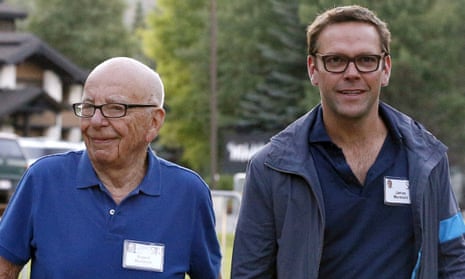James Murdoch kept a life-size model of Darth Vader outside his office when he ran the British arm of his father’s media empire, either unaware or unconcerned by comparisons to evil empires or dysfunctional father-son relations.
In agreeing to sell $66bn (£49bn) worth of assets in 21st Century Fox to Disney, the owners of the Star Wars franchise, the Murdochs have once again proved that, a bit like the jedi saga, there is always another chapter. And more surprises.
The proposed deal may reshape Hollywood and add a footnote to the industrial revolution rocking the media business, but the really interesting story here is what this means for Rupert Murdoch and his dynastic ambitions.
Analysts and long-time Murdoch watchers appeared in no doubt of two consequences for the Murdochs: that the first significant sell-off in the 86-year-old’s storied career represented a retreat; and that the deal marked a professional separation between Rupert and his youngest son.
Despite his protests to the contrary in a conference call with investors on Thursday, the merger felt like an attic clearance and sale of the family home before moving into the smaller seaside condo. Rupert will remain major shareholder in and co-chair of News Corp, a publishing arm that owns the Times and the Sun newspapers in the UK, as well as the Wall Street Journal, Dow Jones and Harper Collins. Alongside his eldest son, Lachlan, he will also control New Fox, the controversial news channel. In total, Rupert Murdoch patriarch has six children.
“I know a lot of you are wondering, ‘Why did the Murdochs come to such a momentous decision?’” he said to investors on Thursday. “Are we retreating? Absolutely not. We are pivoting at a pivotal moment.”
Since taking over a small Adelaide-based newspaper more than half a century ago, Murdoch has typically pivoted through takeovers, not sales (even if he calls them mergers). The only significant sale since becoming a global empire was a move to see off a potential bidder for his News Corp conglomerate.
Yet, since then, the failure to convince Time Warner shareholders to accept a takeover in 2014 and continuing delays in the Murdoch-controlled Fox’s bid to buy Sky appears to have convinced the Murdochs to retrench.
Lachlan Murdoch, the eldest son called “first among equals” by his father, said of the deal on Thursday: “Sometimes the right decisions are the hardest ones and this is no exception.” As co-chair of News Corp – Murdoch’s newspaper business – he called the post-deal remnants of Fox, which include Fox News, a “lean aggressive challenger brand”.
The remaining TV assets will focus on the parts of the business Rupert loves: news and sport. The bits to be merged with Disney – film, entertainment, even the National Geographic brand – are the bits his youngest son James most appreciates. In a way, the biggest surprise when the deal was announced after weeks of speculation was that there was no readymade job for Fox’s 45-year-old chief executive, James Murdoch. In the past week, his team have briefed journalists that he was being groomed to succeed Bob Iger as head of Disney.
Instead, the press release confirmed the Disney chief executive’s contract had been extended until 2021. There was then no mention of James at all.
The deal is expected to take at least a year to gain approval but this leaves James likely to leave his father’s business after 21 years. He currently has only a limited, non-executive role at News Corp.
Claire Enders, founder of the eponymous media consultancy, believes James was the architect of the Disney deal. The younger son convinced his family that the emergence of larger, more agile tech firms would leave Fox without adequate scale to compete, she says.
She also believes the separation of the younger son from his father’s business was due to a fundamental difference: there is an incompatibility there, between pursuing the commercial goals James wants and the political ones his father wants.
There have been increasing signs of differences between the two generations. When Trump called neo-Nazi marchers “very fine people”, James – socially liberal and keen on the environment – made a $1m donation to the Anti-Defamation League, which fights antisemitism.
Some friends still believe James is in with a good chance of succeeding at Disney once Iger steps down. But a man whose father bought the hip-hop music label he founded after dropping out of Harvard and has worked for no one else will have to prove himself as an executive first of course.
One keen Murdoch watcher said that doing the deal without guaranteeing a job for James was a sign that it was Rupert who was becoming increasingly frustrated with his youngest son. “This is Rupert getting rid of James. He once fell out with his boat captain but, rather than sack him, he sold the boat. He finds confrontation very hard.”
Asked what James would do next – there are rumours of a new start-up – another former friend suggested he should “reread Machiavelli”. Whatever the truth behind the family saga, business realities such as economies of scale and bigger, wealthier tech-based rivals are being weighed up by an 86-year-old patriarch who has talked only of legacy.
There is a new generation – and new names – taking control of the global media. Rupert Murdoch, meanwhile, is set to be remembered for the purchases he made in the 20th century and a symbolic sale he made in the 21st.

